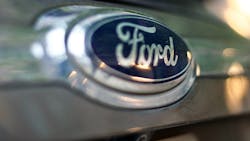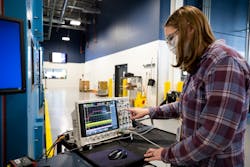Ford's Commitment to Battery Innovation is Far From Shocking
The interest in electric vehicles (EVs) has moved into the fast lane in recent months with a number of manufacturers ranging from a growing array of startups focused on capturing niche markets to established OEMs known for effectively producing internal combustion engines joining in. As a result, aggressive commitments have made headlines and companies have worked diligently to achieve noticeable gains in building out the charging infrastructure necessary to keep the next generation of vehicles operating smoothly.
Ford Motor Co. has not shied away from making its own announcements around EVs. Most notably, a commitment to invest at least $22 billion through 2025 to deliver connected, electrified vehicles, building on its areas of strength, starting with EV versions of its most popular nameplates. In North America, the Ford Mustang Mach-E already has found early sales success. Plus, the all-electric Ford Transit is set to go on sale late this year and the all-electric F-150 arrives by mid-2022.
However, despite all the excitement, a big elephant remains in the room. Simply put, batteries represent valid concerns, not only in effective routine usage but also what happens post-operational life.
Ford wants to be part of the answer.
As part of its commitment to electrification, Ford announced a $185 million investment in a new global battery center of excellence named Ford Ion Park. “We want Ford Ion Park and its team to accelerate the research and development of battery and battery cell technology – including future battery manufacturing, Jennifer Flake, Ford spokesperson tells IndustryWeek.
The automaker is building on nearly two decades of battery expertise by centralizing a cross-functional team of 150 experts in battery technology development, research, manufacturing, planning, purchasing, quality, and finance to help Ford more quickly develop and manufacture battery cells and batteries.
“We’re already scaling production of all-electric vehicles around the world as more customers experience and crave the fun-to-drive benefits of electric vehicles with zero emissions,” said Hau Thai-Tang, Ford's chief product platform, and operations officer, in a statement. “Investing in more battery R&D ultimately will help us speed the process to deliver more, even better, lower-cost EVs for customers over time.”
“We are creating new tools and solutions we need for a carbon-free, affordable and better future,” Thai-Tang said in a statement. “We are modernizing Ford’s battery development and manufacturing capabilities so we can better control costs and production variables in-house and scale production around the world with speed and quality.”
According to Flake, a successful investment would mean, “unlocking better integration and innovation opportunities across all aspects of the value chain – from mining to potential future manufacturing processes to recycling.”
Central to the investment is a collaborative learning lab in Southeast Michigan scheduled to open in late 2022.
This world-class 200,000 sq.-ft. learning lab will include pilot-scale equipment for electrode, cell, and array design and manufacturing and will use state-of-the-art technology to pilot new manufacturing techniques that will allow Ford to quickly scale breakthrough battery cell designs with novel materials once the company vertically integrates battery cells and batteries.
With 32 US patents in automotive power electronics and hybrid vehicle technologies to his name, Anand Sankaran will lead the Ford Ion Park team as its new director. A 30-year veteran of Ford, Sankaran brings to the new position decades of battery and electrification expertise – including his current role as the company’s director of Electrified Systems Engineering, as a 1999 Henry Ford Technology Award winner for his electrification work at the Ford Research Lab and a product development leader who applied his research and technical innovations on key production vehicles, including the award-winning original Escape Hybrid, 2021 Mustang Mach-E, and 2022 F-150 Hybrid.
The Ford Ion Park team will ensure batteries are optimized for its diverse customers – from daily commuters to performance enthusiasts to commercial vehicle fleet operators. The team will apply customer insights to optimize battery technologies that deliver the performance and capability truck, utility, commercial vehicle, and fleet owners value most. That means creating distinct batteries and technologies to deliver meaningful towing and off-road capability for truck customers as well as stop-and-go driving efficiency for fleet operators in cities worldwide.
Additionally, Ford’s new Battery Benchmarking and Test Laboratory in Allen Park, Mich., will help quickly test and identify the right battery cells and chemistries to power Ford’s growing EV lineup to best meet different customers’ needs.
The growing commitment to internal battery operation could be increasingly important to Ford going forward, explains Flake. “Ford’s plan is to lead the electric revolution, and our ability to do that depends on the progress we make on battery energy density and cost,” she says. "We’re launching Ford Ion Park to help accelerate our efforts in this kind of R&D.”
About the Author
Peter Fretty
Managing Editor
As a highly experienced journalist, Peter Fretty regularly covers advances in manufacturing, information technology, and software. He has written thousands of feature articles, cover stories, and white papers for an assortment of trade journals, business publications, and consumer magazines.

